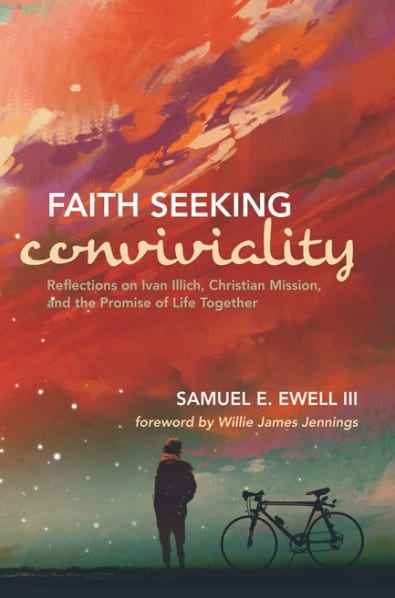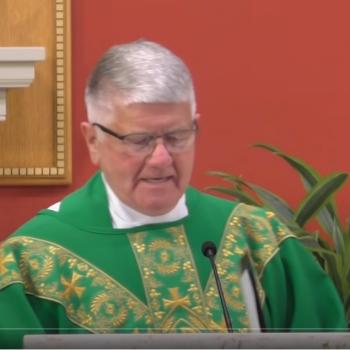Faith Seeking Conviviality, a new book from Samuel Ewell, a U.K.-based social entrepreneur, is grounded in the author’s lived experiences in the form of a seven-year long stay in Brazil. And yet it is also a kind of spiritual/intellectual travelogue with striking reflections on Christianity, culture, and this special thing called conviviality.
For readers who have not yet looked into the work of 1970s icon Ivan Illich, the Catholic social theorist and tradition-based radical, Ewell has woven together alternating chapters of personal biography with an ongoing meditation on Illich and his writings. By the end, we feel we have met both the author and this foundational figure in the movement to de-institutionalize society as we follow the gradual unfolding of Illich’s impact on Ewell. The book is thus “an exercise in doing theology with and after Illich,” in the author’s description.
In 1999, Ewell, a Duke Divinity School-trained theologian, married Brazilian-born Rosalee Velloso da Silva whom he had met while they were in grad school together. Their marriage ceremony included readings from the Book of Ruth, with its famous promise that “your people will be my people.” They decided to take an offer to do a teaching and missionary stint in Londrina, in the southern state of Paraná in Brazil, where Ewell did indeed make the people of Brazil his people to a remarkable degree.
While becoming a “brasicano” (i.e., someone whose culture is halfway between Brazil and the U.S.), the author also met Claudio Oliver, a pastor in the nearby city of Curitiba, who gave him a copy of Illich’s famous-notorious 1968 speech called “To Hell with Good Intentions.” Long before any notable debate about globalization’s effects (the term in those days was “development”), Illich was sounding an alarm about the “benevolent invasions” sponsored by both the American government and the American Catholic Church into the southern hemisphere. He urged his young audience of do-gooders coming to “help” the people of Mexico to think again about their motives and what they were bringing. Just as Illich himself as a European felt the “Americanizing” tendencies at work on the foreigner here, he cautioned about “the seamy side of charity.” Ewell, still newly arrived and carrying his own notions of “helping” was thunderstruck by the speech and began to dig into Illich’s work in order to understand his foundational ideas.
The latter project simply took Ewell more deeply into practical theology with his new Brazilian community, inspiring him to join a samba circle (as a newbie percussionist) and to take on a volunteer position helping the nearby Claretian sisters manage a large garden (“a demonstration plot for finding and sharing the fullness of life that begins in a garden (Gen 1–2) and ends in a garden city (Rev 22).” (Here’s a video of Ewell presenting on this set of ideas.)
Over time Ewell learned more about why he was in Brazil and what he was doing there, “offering a distinctively Christian presence that is missionary without being manipulative.” In the spirit of Illich, he made the “convivial turn,” toward a preferential option for freedom in interdependence as a way of reclaiming the freedom of living. Theologically speaking, it was a shift from mission as expansion of something in favor of mission as encounter — importantly, incarnational mission.
The author remarks at one point on the irony that for many years the CIA seemed to know a good deal more about Illich and his work than the average American theology department. Now that Illich — this pilgrim, this 20th-century itinerant intellectual priest, half-Catholic, half-Jewish — is coming to be seen as the prophet of post-development, post-scarcity thinking, certainly anyone doing political theology today is likely to be aware of him.
Moreover, what I would call the ongoing institutional collapse of most of American Christianity — visible in its deadly embrace of partisan politics and its catastrophic role as both court chaplain and fund-raising arm of that politics — we are well able to understand one of Illich’s most shattering perceptions: that our condition is the “corruption of Christianity.”
By this phrase he was not suggesting that modern America had abandoned this heritage (pace the culture warriors) but that the forms of Christianity had become institutionalized and thus distorted to the point of betrayal of the message itself. The American Catholic Church (and, he would likely have acknowledged, virtually all churches today) has sacralized the institution, its employees and property — not the human person nor the community.
The dominant notion in American Catholicism for at least half a century has been that unchanging right doctrine is the foundation of right living: conversion of the individual is everything, whereas any sense of community spirituality is almost entirely lacking. (Was the 1960s Civil Rights movement the last time American churches shared such a practice?)
In the time of pandemic, we might also note Illich’s view that the pursuit of health is not primarily a technical task but a collective task and therefore a political one. (His excellent interpreter David Cayley has just posted his thoughts on how Illich might see our present public health catastrophe.)
For all that, Illich is not preaching despair but rather “the recovery of hope as a social force.” Ewell puts it beautifully: “Christian hope centers desire on a person from whom we await a gift.” Thus conviviality means rediscovering an intense hospitality which dispels our perception of scarcity. We cannot be in thrall to our institutions in order to petition them over our needs and what Illich might call some counterfeit hope of expectations.
As Ewell’s insightful book describes, if we can succeed in making this turning, this metanoia, we may recapture Illich’s view of the Incarnation as a surprise, always a surprise, and never anything else.













